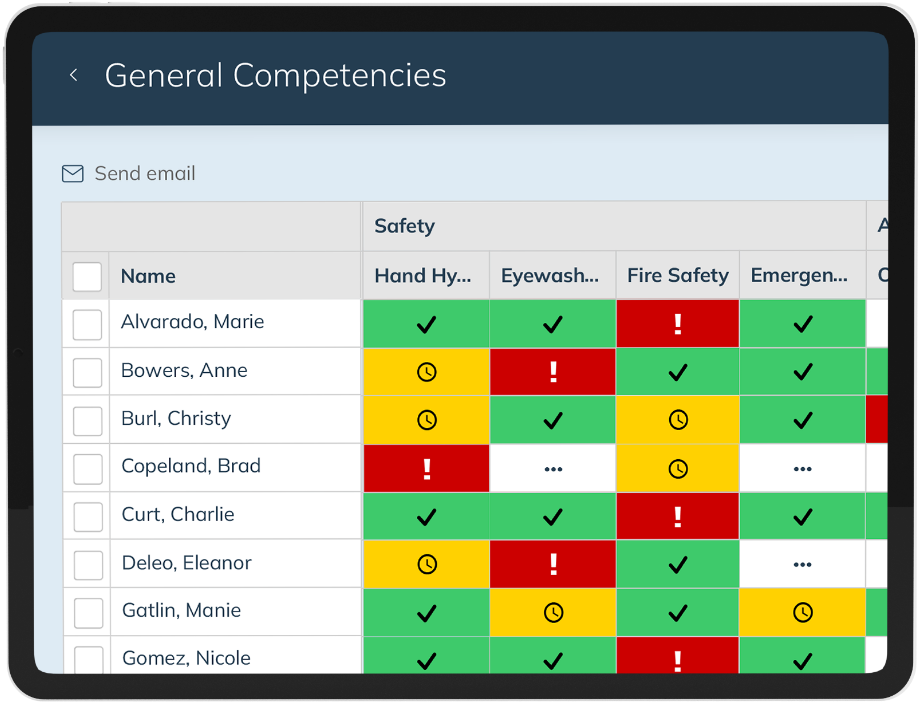Authored By:

The Power of Healthcare Software Integration and Digital Competency Management Platforms
The healthcare industry is witnessing a dynamic transformation, driven by the integration of software systems that revolutionize patient care, resource allocation, administrative efficiency, and risk mitigation. In this era of digital prowess, healthcare organizations must embrace innovative technologies, especially digital competency management platforms, to navigate staffing constraints and elevate their digital literacy.
This blog post delves into the significance of software systems integration and its profound impact on healthcare, focusing on the transformative capabilities of digital competency management platforms.
Streamlining Resource Allocation
One of the foremost advantages of software systems integration in healthcare is the streamlining of resource allocation. Traditional resource allocation methods often rely on manual processes that can be time-consuming and prone to errors. However, by integrating various software systems, such as electronic health records (EHR), patient scheduling, and inventory management, healthcare providers gain real-time insights into patient demand, staff availability, and resource requirements.
Digital competency management platforms play a pivotal role in optimizing staff allocation by providing detailed insights into the competencies and skills of healthcare professionals. This enables organizations to match specific tasks with the most qualified individuals, resulting in improved patient outcomes and more efficient use of resources.

Overcoming Resource and Staffing Constraints
Healthcare organizations frequently face resource and staffing constraint challenges. These constraints can arise due to fluctuations in patient volumes, unexpected staff absences, or rapidly changing medical requirements. Software systems integration, coupled with a digital competency management platform, helps healthcare facilities tackle these issues more effectively.
By integrating digital competency data with scheduling systems, administrators can identify staff members with the necessary skills to fill critical roles promptly. This ensures patients receive the care they need, even during peak demand periods, reducing wait times and enhancing overall patient satisfaction.
Optimizing Administrative Operations
The integration of software systems is not limited to clinical aspects but extends to the administrative side of healthcare operations as well. Digital competency management platforms enable streamlined record-keeping and tracking of staff training and certifications. This eliminates the need for cumbersome paper-based processes and simplifies compliance reporting.
Moreover, integrated software systems facilitate seamless communication and collaboration among different departments, enhancing efficiency and reducing administrative burden. By centralizing administrative functions and competency data, healthcare organizations can allocate their resources more effectively and focus on patient care.
Mitigating Risk from Lost Documentation
Lost or misplaced documentation can have severe consequences in the healthcare sector, leading to medical errors, legal liabilities, and compromised patient safety. Healthcare software integration, particularly with the aid of digital competency management platforms, serves as a powerful tool to mitigate such risks.
With a centralized digital platform, all relevant documentation, including training records, certifications, and competencies, are securely stored and easily accessible to authorized personnel. This level of digital organization ensures that critical information is readily available at the point of care, minimizing the potential for errors and safeguarding patient well-being.
Conclusion
The integration of software systems in healthcare, supported by robust digital competency management platforms, has become indispensable in today’s digital age. These advancements enable healthcare organizations to optimize resource allocation, overcome staffing constraints, streamline administrative operations, and mitigate the risks associated with lost documentation.
By embracing software systems integration and digital competency management, healthcare facilities can enhance their digital proficiency, drive improved patient outcomes, and achieve a higher standard of care for all. As the healthcare landscape continues to evolve, investing in these technologies is not just a choice but a necessity for staying ahead in a digitally empowered world.




